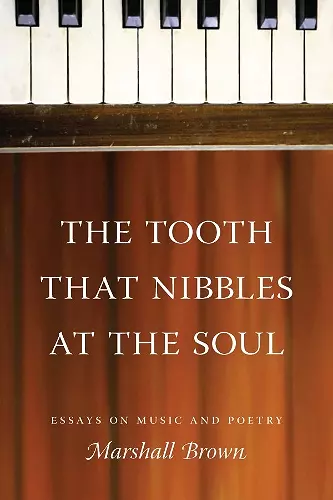The Tooth That Nibbles at the Soul
Essays on Music and Poetry
Format:Hardback
Publisher:University of Washington Press
Published:29th Jun '10
Currently unavailable, and unfortunately no date known when it will be back
This hardback is available in another edition too:
- Paperback£27.99(9780295990064)

Marshall Brown is simply one of the finest literary critics we have and one of the very few who are equally at home with literature and music. He is a classic example of the erudite scholar who wears his learning lightly; he writes with wit and verve; no one does close reading better; and he has the gift of constantly being able to surprise as well as to inform and stimulate. All serious students of literature and the arts will want to read this book, which they will find themselves not simply absorbing, but using. -- Lawrence Kramer, author of Why Classical Music Still Matters
Includes essays that engage questions that are central to the development of literature, music, and the arts in the period from Romanticism at the end of the eighteenth century to the avant-garde movements of the early twentieth, a period in which modern evolution of the arts is coupled with a rise in the significance of music as artistic form.
The Tooth that Nibbles at the Soul brings together Marshall Brown’s new and previously published writings on literature and music. These essays engage questions that are central to the development of literature, music, and the arts in the period from Romanticism at the end of the eighteenth century to the avant-garde movements of the early twentieth, a period in which the modern evolution of the arts is coupled with a rise in the significance of music as artistic form.
With a special focus on lyric poetry and canonical composers including Mozart, Bach, Beethoven, Brahms, and Schubert, Brown ties the growing prominence of music in this period to the modernist principle of abstraction. Music, as Brown provocatively notes, conveys meaning without explicitly saying anything. This principle of abstraction could be taken as the overriding formula for modernist art in general; and it explains why in this period music becomes the model to which all the other arts, in particular painting and literature, aspire.
Brown’s title, taken from a poem by Emily Dickinson, reminds us that abstraction -- musical and artistic – is anything but toothless; indeed, it “nibbles at the soul” in subtle and enduring ways. Throughout his wide-ranging and erudite analysis, Brown’s goal is to pinpoint the nature of music’s bite and to illuminate the shared elements of literature and music.
While there are many previous comparisons of music and poetry, few are systematic or based on a solid knowledge of both literary criticism and musicology. Brown’s essays can be enjoyed by a general, well-read public not trained in either music or eighteenth-century literature, as well as by an audience steeped in sophisticated (if not technical) musical analysis.
"He brings to discussions of music not only an accurate and precise analytical vocabulary, but the performing experience of a first-class cellist. At a time when many scholars claim to be 'interdisciplinary,' . . . it is thrilling to encounter the real thing."
-- James A. Winn * Eighteenth-Century life *"The thread that runs through the whole—- the understanding of music and poetry as kindred art forms that resist fixity and capture the motion of our thought—- is deeply engaging, and provides us a language to delve further into the music of poetry and the poetry of music."
* Wallace Stevens JournISBN: 9780295990057
Dimensions: unknown
Weight: 748g
384 pages